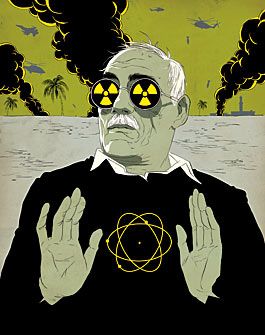Octavius Hite

Joined: 28 Jan 2004
Location: Househunting, looking for a new bunker from which to convert the world to homosexuality.
|
 Posted: Thu Jul 27, 2006 9:34 am Post subject: China to lionize Bethune in 20-part TV extravaganza Posted: Thu Jul 27, 2006 9:34 am Post subject: China to lionize Bethune in 20-part TV extravaganza |
 |
|
This should be interesting, I would love to see this film if they have english subtitles, I love the part about Mao loving children! He certainly loved those little girls!
http://www.theglobeandmail.com/servlet/story/LAC.20060727.BETHUNE27/TPStory/Front
| Quote: |
BEIJING -- A Canadian surgeon will become the focus of a televised extravaganza in China next month as the Communist regime pushes a new morality campaign to combat the persistent climate of corruption and greed in the country.
Norman Bethune, who died in 1939 while helping Communist soldiers at the battlefront in northern China, will be lionized in an unprecedented 20-part prime-time series on China's biggest television channel.
The series, sponsored by the propaganda division of the Shanghai government, is a key element in China's latest effort to revive a "socialist sense of honour" in a country where ideology has faded and morality has eroded.
The series on Dr. Bethune's life is part of a summer of celebrations of the 85th anniversary of China's Communist Party. The Canadian doctor will be extolled as a moral lesson for the nation, a man who sacrificed his own life to save thousands of Chinese soldiers.
Earlier this year, President Hu Jintao unveiled his list of "eight honours and eight disgraces," an earnest set of moral rules for the Chinese people. The rules were printed on millions of posters and distributed all over the nation. Model citizens were given awards in special ceremonies, and officials gave speeches on morality.
Mr. Hu's rules were a throwback to an older and simpler value structure. He urged citizens to "serve the people" and "love the motherland," to "live plainly and struggle hard" without "wallowing in luxuries and pleasures."
At the same time, Beijing has launched a series of campaigns to revive Marxism, to strengthen "patriotic education," and to elevate the morality of the Communist Party's rank-and-file members. Millions of party members and other citizens have been forced to attend lengthy lectures and to write confessions of their faults.
In the midst of these campaigns, China's propaganda strategists are reaching back into the past for a hero of the early Communist era. The Canadian surgeon was first eulogized by Mao Zedong in an essay in 1939, which became a mandatory subject of study in all Chinese schools, making him the most famous foreigner to have lived in China.
In recent years, however, Dr. Bethune has fallen into relative obscurity, and many younger Chinese know little about him. The TV series, which begins on Aug. 12 with two episodes every night for 10 days, is aimed at reviving his usefulness to the party as a role model and Communist icon.
The series, starring Canadian actor Trevor Hayes as the surgeon, traces his roots back to his childhood in the Ontario town of Gravenhurst. With a budget of $3-million and a cast of more than 100 foreign actors (the most ever in a Chinese TV production), along with scores of Chinese actors, the series is one of the most ambitious Chinese TV biographies ever produced.
But it also serves another purpose: promoting the official myths about the heroism of Mao and his Communist Party comrades, reinforcing the legitimacy of the party's rule at a time when many Chinese have lost faith in it.
The series portrays Mao in hagiographic style. He is first introduced as a humble leader who collects dung from the dirt roads of northern China to serve as fuel for his Red Army soldiers as they fight the occupying Japanese army in 1938. He is portrayed as a kind, smiling man who loves children and simple food and expresses great wisdom in his dealings with Dr. Bethune.
The series culminates with the death of Dr. Bethune, who succumbed to blood poisoning after cutting his finger while treating Communist soldiers at the front lines in 1939, a year after arriving in China to help the Communist cause.
China's state-run media have heaped praise on the television series already, seeing it as a way of reinforcing Mr. Hu's lessons to the nation. One newspaper said the series was "a vivid educational material to promote the socialist honours and disgraces."
The director of the series, Chinese filmmaker Yang Yang, broke into tears as she told Chinese journalists about Dr. Bethune. "His great personality conquered me, time after time," she said. "I felt an eternally grateful love for him. . . . We shouldn't forget that there was a foreign brother who abandoned his comfortable life and came to China to share our misery and help us."
But many young Chinese people, even those required to study Mao's essay on Dr. Bethune, are still indifferent to him. "I won't watch the TV series," said Wang Wusi, a 23-year-old website editor in Beijing. "I don't have time. It's meaningless to me." Although she was required to study Mao's essay in school, Ms. Wang was uncertain which war he had served in. "I can't remember much about him," she said.
Li Xiaoxi, a 14-year-old schoolgirl in Beijing, was even more confused about the Canadian surgeon. "His portrait is hung on the classroom wall, with a sentence below it, but I can't remember the sentence," she said. "I think the teachers might have mentioned that he was a great man, but that's all I know." |
|
|

